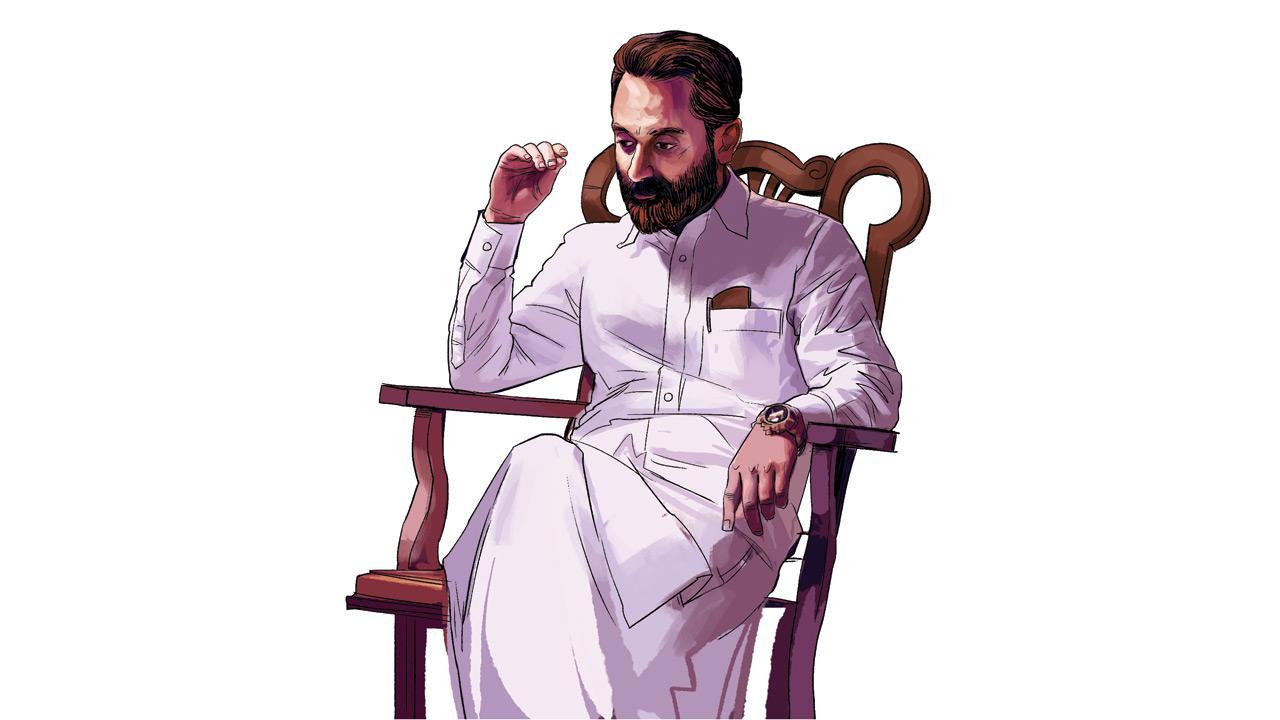We see how politicians and police collude to repeatedly stoke communal hatred between Muslims and Christians, by playing on their insecurities and ambitions, over generations, in Ramadapally village, Trivandrum

Illustration/Uday Mohite
Watch out Bollywood, Malayalam cinema is leaving you behind, yet again. Mahesh Narayanan’s Malik (Malayalam), starring Fahadh Faasil and Nimisha Sajayan, is a compelling, sprawling epic—a web series really—packing a lot into a tightly wound, intimate film. It dropped on Amazon Prime Video last week. Bollywood’s more daring political stories may feature a Hindu-Muslim romance. But Malayalam cinema is usually ahead of the curve: they know the majority community is mostly converted to right-wing ideology, and well poised for mutual annihilation by stoking an endless cycle of violence; Malik addresses the next battle, minority versus minority. We see how politicians and police collude to repeatedly stoke communal hatred between Muslims and Christians, by playing on their insecurities and ambitions, over generations, in Ramadapally village, Trivandrum.
ADVERTISEMENT
Narayanan’s third film after Take Off and CU Soon, Malik explores the friendship of two young fishermen-turned-smugglers—Sulaiman (Faasil) and David (Vinay Forrt), the rise of Sulaiman as a don, and how their politician buddy Abu (Dileesh Pothan, also director of Joji), exploits their friendship to turn the Muslim and Christian communities against each other. Sulaiman is also a saviour of the community, standing up to politicians and defending communal amity—he insists tsunami refugees be housed in the mosque regardless of their faith—but later has blood on his hands, too. David is a gullible Christian who is repeatedly tricked into communal violence by the corrupt Abu and police, with the next generation also paying the price. The politicians also exploit environmental issues— tsunami-related aid, a coastal highway, sand mining mafia to drive the wedge further. As no one will give evidence against Sulaiman, the police try to pressurise his nephew Freddy to kill Sulaiman in jail. The story is told through the flashbacks of several people. The film doffs its hat to The Godfather and Nayakan when shaping its Robin Hood-like hero Sulaiman. It is epic, with a large cast—like Gangs of Wasseypur, Vada Chennai and Thuramukham (The Harbour), yet Narayanan creates convincing character arcs and many small moments that stay with you throughout. Top Malayalam star Faasil puts in an excellent performance, yet he merges into the story and the ensemble cast, a near-impossible feat for Bollywood stars.
Narayanan directs a powerful film, based on his own screenplay, that is far more complex than his previous work, with a terrific twist in the climax. The film’s complexity arises from David’s sister Roseline (Sajayan) marrying Sulaiman, an inter-faith marriage. We have seen a Muslim-Christian couple on the run in the exquisite Annayum Rasoolum (Malayalam), but here their story is part of a much larger socio-political narrative. Notice the tactical brilliance with which Narayanan places the big conversion question in bed, probably just after the couple has had sex, when defences are lowest: Sulaiman tells Roseline, “I will never ask you to cover your head or to get converted, but I want to raise our children as Muslims… and I need your permission for that.” Making a near-fait accompli seem like a humble request—sheer masterstroke! The big emotional explosion, as when a mother testifies against her own son in court, is done without any Deewar-style melodrama, and is a masterclass in how restraint can pack a punch. Narayanan has several strong women characters, rare in a single film: Sulaiman’s mother who testifies against him in court; Sajayan who threatens the DGP when her husband is in prison; a tough woman jail doctor; the hardened woman Inspector General of Prisons; and Sulaiman’s daughter Ramla, a modern girl in hijab, who frankly tells her mom about her boyfriend, “He’s Asif, son of Yusuf Uncle, who does liquor business.” Also, it is thrilling to see a realistic range of normal Muslim characters—good, bad, courageous, generous, cowardly—instead of the lazy and dangerous Muslim = terrorist stereotype in which Bollywood specialises.
The lean, restrained Faasil shows yet again that he is one of India’s finest actors; the delicate salt and pepper in his hair making him impossibly sexy. Sajayan commands her own; Forrt and Sanal Aman as his son Freddy are good, along with the ensemble cast. Sanu John Varughese cinematography is magnificent, from his opening, long fluid takes that invite us to participate in the film’s world. Narayanan, who wrote, directed and edited the film, keeps the pace brisk as a whip (2h41min), yet lets you absorb it all. Sushin Shyam’s music is good. Special shout-out to production designer Santhosh Raman and costume designers Dhanya Balakrishnan and Shukoor: I delighted in the smuggler’s booty: National Panasonic washing machines, Sanyo products, Nivea cream written in Arabic, Quink Ink (remember those?). And I loved how David’s smuggled shirts become increasingly colourful, while Sulaiman’s sober stripes sublimate to simply a white shirt and veshti. Bravo to the team and producer Anto Joseph.
Meenakshi Shedde is India and South Asia Delegate to the Berlin International Film Festival, National Award-winning critic, curator to festivals worldwide and journalist.
Reach her at meenakshi.shedde@mid-day.com
 Subscribe today by clicking the link and stay updated with the latest news!" Click here!
Subscribe today by clicking the link and stay updated with the latest news!" Click here!






